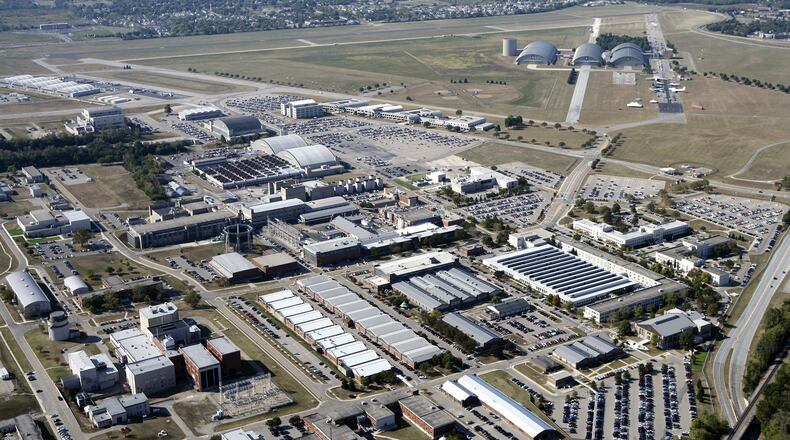The units represent a significant portion of work at Wright-Patterson: the 18th Intel Squadron, AFRL (Air Force Research Lab) Research Lab Mission Execution, Counter-Space Analysis Squadron, Space Analysis Squadron and the AFRL Sensors Directorate.
The new announcement does not entail any immediate addition or subtraction of jobs to or from Wright-Patterson, Ohio’s largest single-site employer with 30,000 military and civilian employees.
RELATED: Defense secretary: No need to duplicate NASIC through Space Force
Approximately 1,840 Air Force billets — or military jobs — will be transferred into the Space Force from across the 23 total units in Space Force’s announcement, which also touched on missions at several other military bases.
“This transfer plan does not include the physical movement of units or billets to a different geographic location, nor does it include moving any of the people assigned to units,” the Space Force statement said Wednesday. “The missions and billets will simply be transferred to the Space Force and remain in place to leverage the talent, infrastructure, and key capabilities at their current location.”
Space Force’s goal is to have each of the 23 space missions formally transferred from the Air Force into the Space Force in the next three to six months “based on timing and conditions specific to each organization and mission.”
Also set aside for transfer to the new Space Force are units from Schriever and Buckley Air Force bases in Colorado, Nellis AFB in Nevada, Fort Meade in Maryland, Kirtland AFB in New Mexico, Edwards AFB in California and elsewhere.
The chief of staff of the Air Force, Gen. David Goldfein, and the chief of space operations, Gen. John "Jay" Raymond, have been delegated the authority to execute the transfer when they agree the necessary conditions have been met to affect a smooth transfer, the Space Force announcement said.
U.S. Rep. Mike Turner, R-Dayton, and Dayton defense leaders are greeting the news as a “substantial win” for Wright-Patterson.
Turner has expressed concern about protecting key Wright-Patt missions as Space Force grows.
“As Space Force develops, it is necessary for its success that Wright-Patterson Air Force Base is involved in its mission,” Turner said in a release. “The Space Force’s announcement that it will transfer five units at Wright-Patt from the Air Force to the Space Force shows that the Pentagon understands the unique capabilities of Wright-Patt in regard to our national mission in space and intends to capitalize on that.
“I have continued to advocate to the Space Force leadership that Wright-Patt and NASIC (the National Air and Space Intelligence Center) have a lot to offer in terms of already developed capabilities and trained personnel that could assist in the Space Force’s mission,” Turner added. “I will continue to advocate for Wright-Patt’s capabilities in space as Space Force is stood up.”
The transfer of Wright-Patterson missions from the Air Force to the Space Force ensures that the base will have an early and important role in the new organization,”said Jeff Hoagland, president and chief executive of the Dayton Development Coalition.
“As the Space Force develops and grows, Wright-Patterson will grow with it, evolving into a base that jointly serves both missions,” Hoagland said.
The status of civilians working for the Air Force is unchanged. They will have the ability to remain in their current positions, or apply for other jobs across the department, the Air Force said.
And new space missions may be identified for transfer, which will be coordinated and approved by separate actions, the Air Force also said.
In February testimony, under questioning from Turner, Defense Secretary Mark Esper agreed that it is important not to duplicate work being performed by NASIC as the fledgling Space Force is created.
“As we look forward to how we organize Space Force, obviously, we’re not looking for reduplication, and I don’t want to break something that’s working,” Esper told the House Armed Services Committee, on which Turner serves.
Esper also told Turner at the time: “So you and I have talked about this before. I’ll take it back and make sure that works in all of our calculations, make sure we consult with you as things evolve. But they (NASIC personnel) do great work there.”
The defense budget President Trump signed in December approves $182 million for a new home for NASIC. The NASIC expansion has been called the largest single construction project in base history.
Construction on that project is expected to start this year, coalition leaders have said.
About the Author

